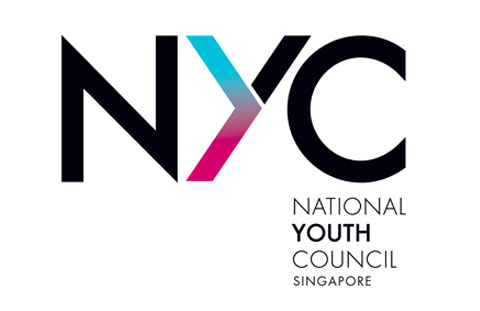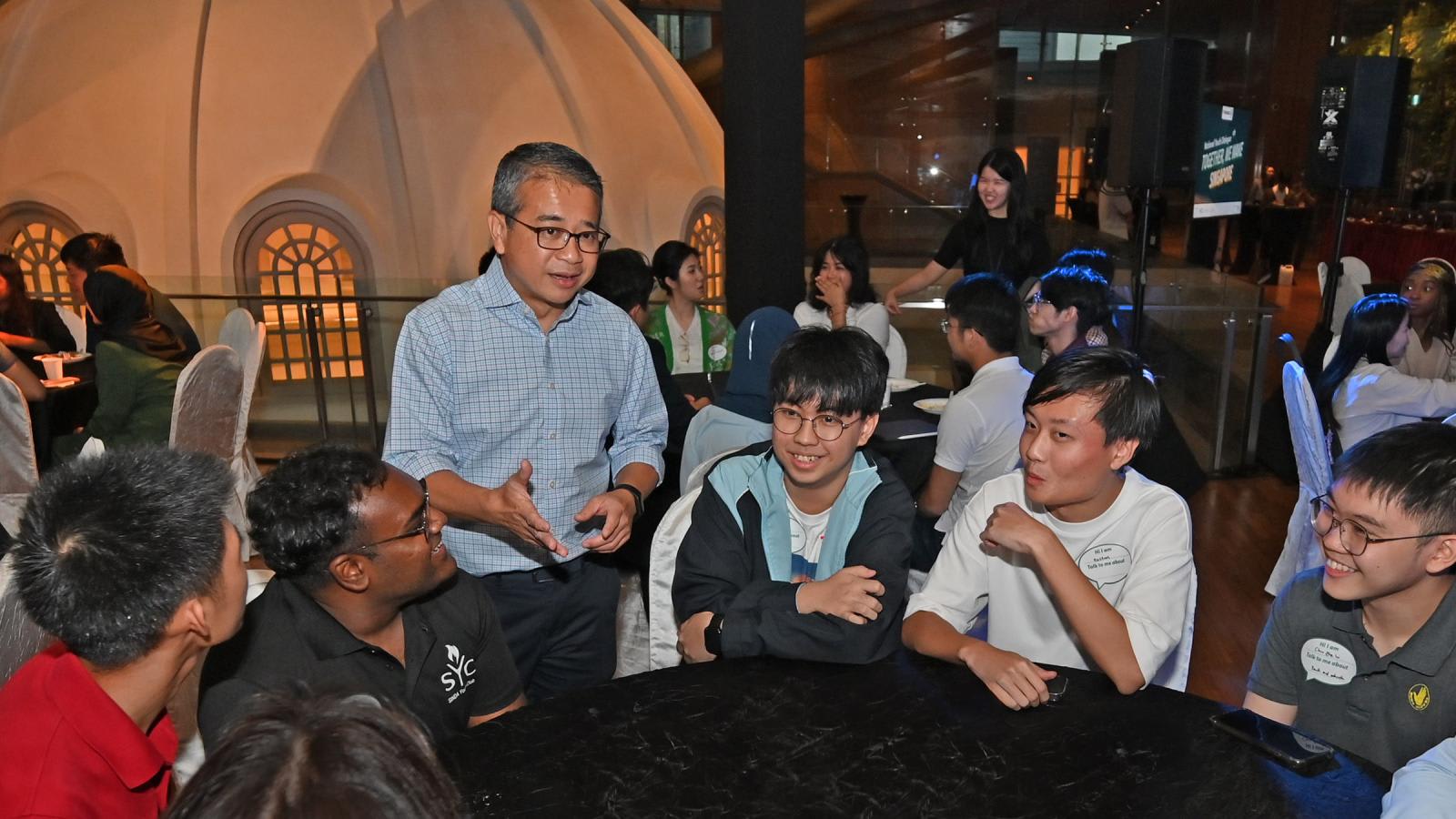If Ms Farah Sanwari had her way, food would never be wasted in Singapore.
The 33-year-old co-director of FiTree, an Islamic environmental group and co-founder of Repair Kopitiam, is a member of the Ministry of Sustainability and the Environment’s (MSE) Youth Circle. It was first formed in 2019 to discuss the gaps and opportunities in the environmental policy space.
With the other seven members of her team – who hailed from the non-profit and corporate sectors – she investigated the potential impact of passing a Good Samaritan law on food donation.
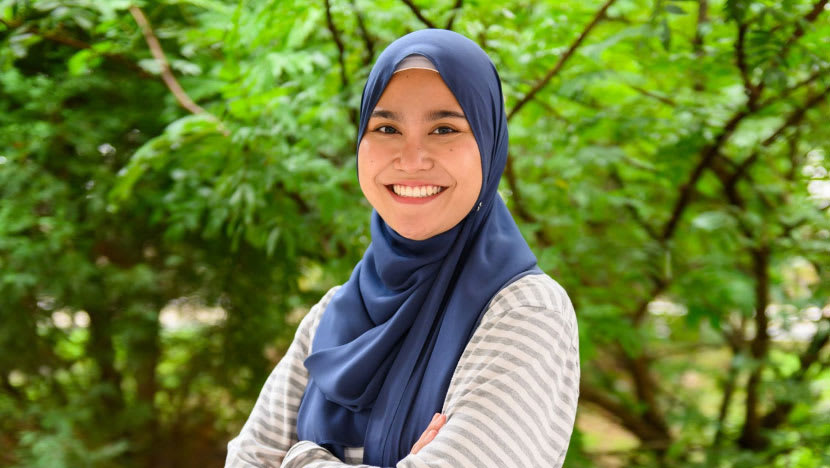
Ms Farah explained: “Many F&B businesses are afraid of the liability from donating unsold food. This, in turn, contributes to food waste in Singapore. Our team posited that by having this law in place, more organisations would feel comfortable donating their excess food.”
Ms Farah is one of the youths who exemplifies the progressive spirit that the Forward Singapore exercise hopes to encourage by setting out a roadmap for Singapore for the next decade and beyond. Efforts are underway for citizens to partner the Government in coming up with ideas on how to continue ensuring opportunities for all, and fostering a greater sense of unity, belonging and responsibility among Singaporeans.
THE PIVOTAL ROLE OF YOUTH VOICES
Rising to the occasion, 150 youths from all walks of life came together to highlight a diverse range of issues they care about and contributed their insights towards policymaking at the sixth edition of the National Youth Dialogue, organised by the National Youth Council (NYC) and the Global Shapers Community (Singapore Hub), on May 24.
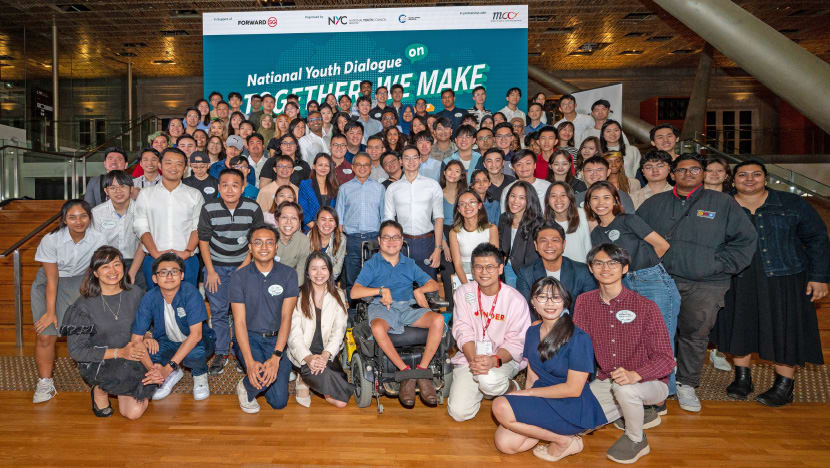
Along with Mr Edwin Tong, Minister for Culture, Community and Youth and Second Minister for Law, members of the panel included Dr Carol Soon, senior research fellow at the Institute of Policy Studies, and Ms Woo Qiyun, environmental advocate at educational media platform The Weird and Wild. Mr Tan Kuan Hian, vice-curator at Global Shapers Community (Singapore Hub), served as moderator for the evening’s dialogue on issues that youths are most concerned about and how to involve them in policymaking.
Issues brought up included education pathways and opportunities, the cost of living, environment and sustainability, jobs and the economy, technology and digitalisation, bullying and cyberbullying, LGBTQ+ issues, and gender equality.
For Ms Calissa Man, 23, a government affairs and public policy consultant, the impact of digital discourse on the real world is the topic she feels most strongly about.
As a former intern at the Centre for Strategic Futures under the Prime Minister’s Office, Ms Man undertook research into social media and online harms. Coupled with other stints in tech, the experience not only kickstarted her interest in the topic, but also showed her how she could contribute to making an impact on society outside of her career.
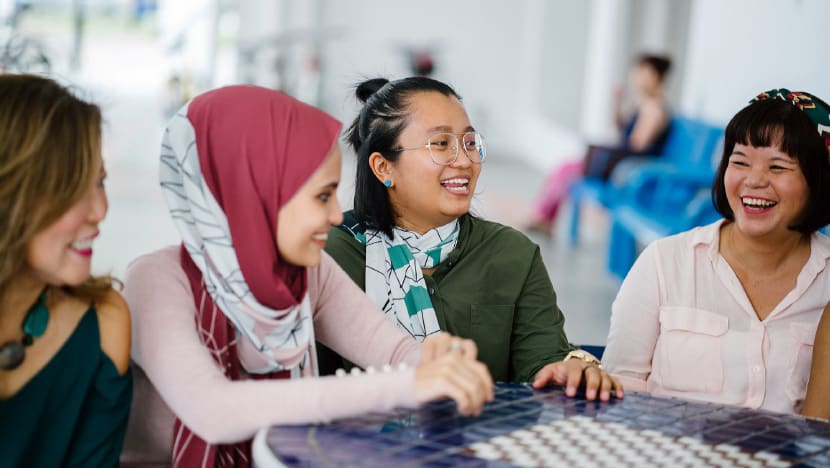
“My research gave me so much meaning and purpose because I knew that my passion and knowledge could make a difference when it comes to ensuring that everyone feels safe, included and respected, be it online or offline,” she said.
Mr Yuvan Mohan, 35, an NYC Council member and a participant of the National Youth Dialogue, also professed an interest in tackling online harms such as cancel culture, which he feels has an impact on whether youths today choose to voice their thoughts.
He said: “Cancel culture has gained prominence in the youth space. Some suggest that it empowers marginalised communities to seek justice, while others feel it may give rise to harassment. My concern is whether, as a society, we will allow young people to share their views and acknowledge that views can change over time, rather than penalising past statements.”
CHALLENGES IN ENGAGING YOUTHS IN POLICYMAKING
According to sentiments garnered from engagements by the National Youth Council, youth involvement in policymaking faces several obstacles, such as youths having limited knowledge of engagement processes, perceived bureaucratic hurdles, as well as a lack of opportunity to contribute.
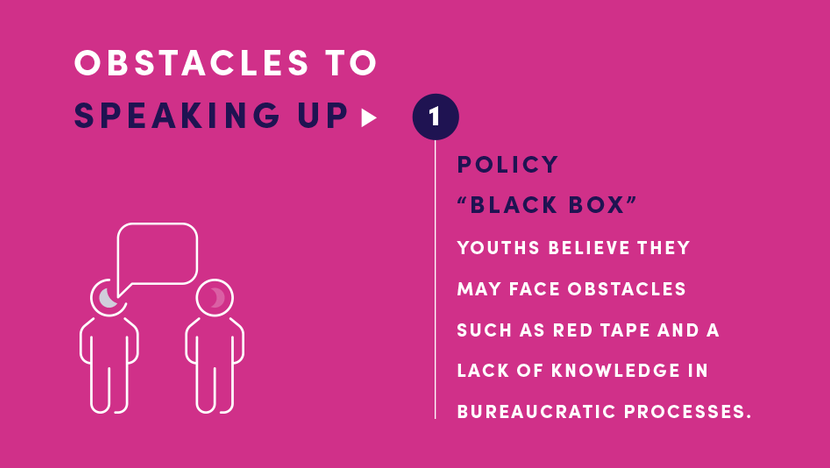
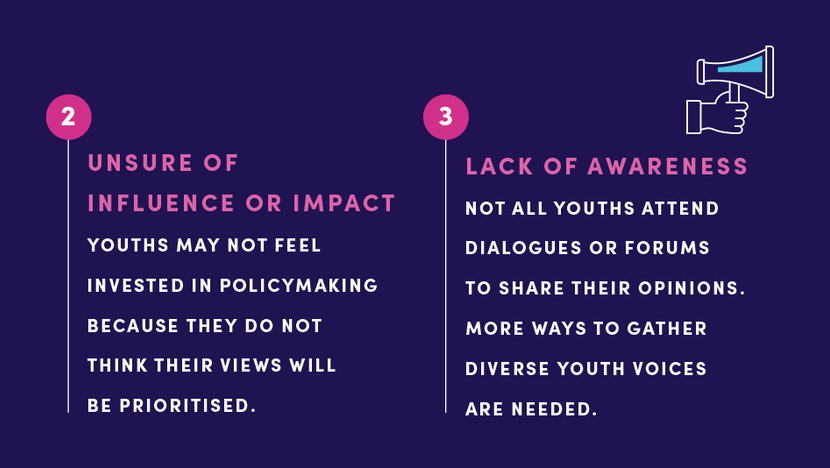
Often, youths also hesitate to express themselves because they do not believe that their voices deserve to be heard. Ms Salwa Sanaullah Khan, a 17-year-old student at Kaplan Higher Educational Institute, was a former youth leader who took an interest in civic engagement after going through NYC’s Our Singapore Leadership Programme (OSLP) for Secondary 4 students last year. The OSLP is an annual programme to develop leadership potential in youths and help them deepen their knowledge and understanding of national issues.
She said that while she was passionate about the environment and sustainability and believed that everyone had a part to play in addressing climate change, she was initially hesitant to speak up. Attending the National Youth Dialogue was her first step towards contributing. “I sometimes feel shy and nervous to participate in such events. But after hearing from everyone, I’ve learnt that if you have a cause you’re passionate about, there’s room for you to speak up.”
Sustainability consultant Woo Qiyun, 25, who was a panellist at the National Youth Dialogue, added that it was important to help youths feel safe enough to share. “Some youths feel like they don’t know enough about the issues they care about, so they don’t deserve to contribute. But all views matter – it is not a prerequisite to know a lot before you can care about something.”
CO-CREATING SINGAPORE’S FUTURE TOGETHER
To address the above obstacles, Minister for Culture, Community and Youth Edwin Tong announced in April that the National Youth Council and other government agencies would lend their support to youth-led panels.
Compared to traditional focus groups, the youth panels will allow youths to co-develop recommendations by giving them opportunities to understand and appreciate the complexities involved in policymaking. The platform aims to drive greater levels of youth engagement by offering more transparency and facilitating the process of getting recommendations from a wider and more diverse range of youth participants. In the coming months, NYC will announce two to three youth panels, each focused on tackling an area of concern for youths.
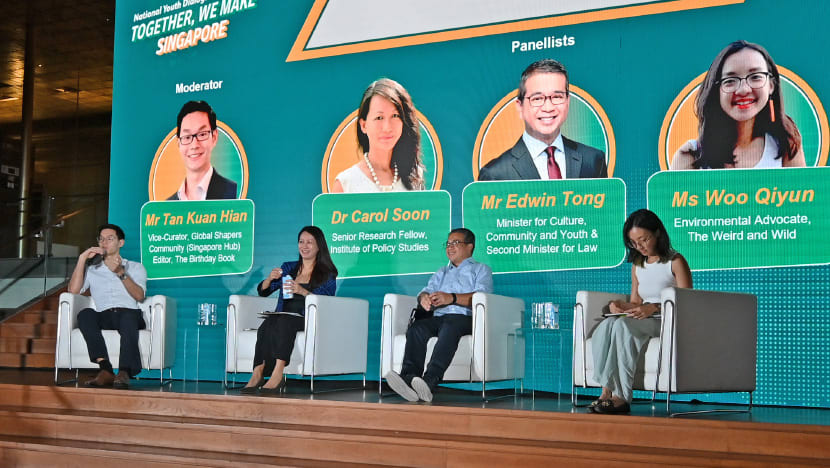
The recommendations from the youth panels may be discussed at Parliament, added Minister Tong in his address at the National Youth Dialogue. This will ensure that youths feel ownership as policy co-creators and provide a sense of conviction regarding the validity of their views.
Panel member, Dr Carol Soon, a senior research fellow at the Institute of Policy Studies, added that it is essential to close the loop when it comes to engaging youths. “People want to know if their ideas will be accepted. If you can see the ‘fruits of your labour’, more people will be willing to contribute.”
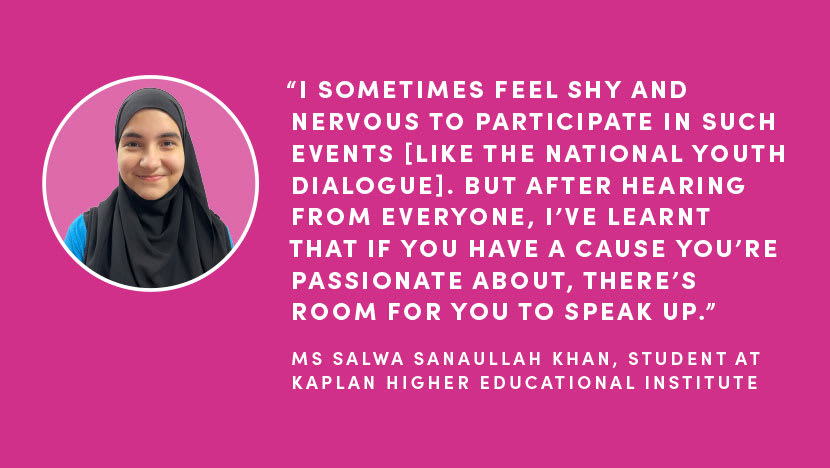
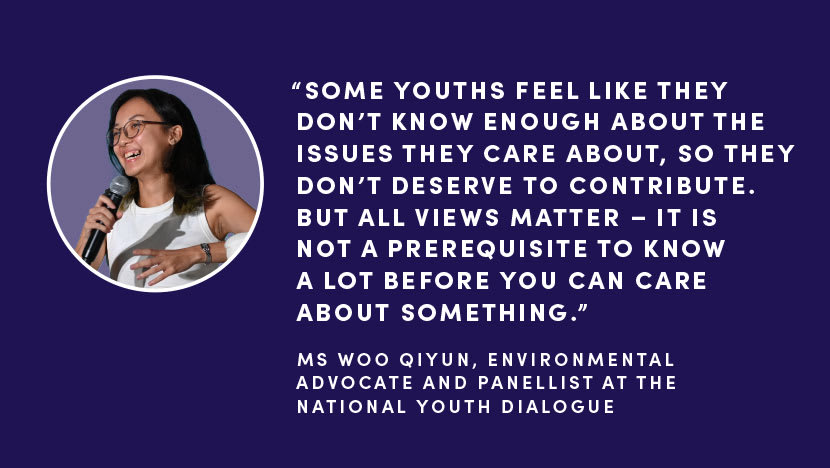
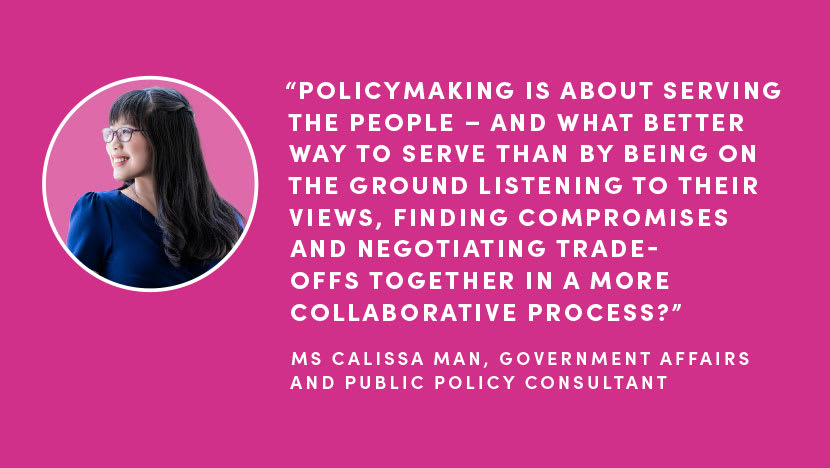
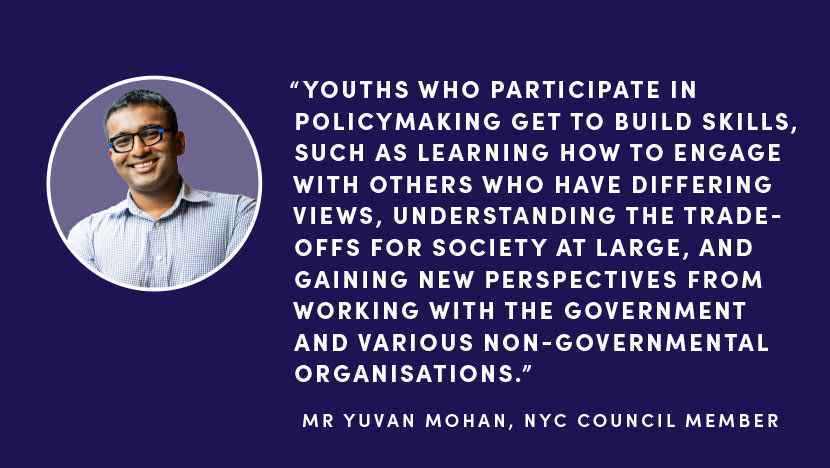




GET INVOLVED – GIVE YOUR VIEWS
Ms Woo Qiyun, an environmental advocate and panel member at the dialogue, reminded the audience that the Government has no monopoly on good ideas, and youths can implement change on a small scale in many ways – not just at the corporate or national level.
Highlighting that Ms Woo herself had written in to him many times about issues she cared about as a resident in his constituency, Minister Tong emphasised that policymaking and recommendations are a two-way exchange between the Government and citizens: “In short, it’s about having the courage and conviction to come forward – even if you think you don’t know very much – to share your thoughts and believe that you can make an impact.”

For Ms Man, one of the most compelling reasons to participate in policymaking as a youth is the simple fact that youths are also impacted by the policies implemented in society.
“Beyond that, youth representation is vital to enrich the outcomes and representation that policies are ultimately meant to achieve,” she said. “On a larger scale, having youths be involved in policymaking is great because it encourages our critical thinking skills and our involvement as active citizens. Those are fundamental to creating a more resilient, inclusive society where everyone can thrive.”
QUICK TAKE WITH: MR SHERMAN HO
The 34-year-old is the co-founder of social enterprise Happiness Initiative, and a member of the SG Mental Well-Being Network. Launched in July last year, the SG Mental Well-Being Network – part of a broader national initiative – strives to build an inclusive society, fostering positive mental health and providing support to those in need.
I think that youths… bring fresh perspectives and ideas to the table, which contributes to creative solutions and fosters innovation.
Being involved in… the SG Mental Well-being Network is an eye-opening experience. I get to see the big picture of what is happening in the mental well-being space, and it is fascinating to observe how the Government and larger agencies come together to address issues.
One challenge I’ve faced is… trying to put myself in the shoes of the Government and larger agencies. As a small, ground-up initiative, we are very nimble and quick to act and make decisions. Working alongside the Government has helped me better understand the complexities involved in managing multiple stakeholders with different perspectives.
I would encourage youths to contribute to policymaking because… it is an enriching and meaningful experience, and will allow you to develop a broader perspective on how you can make an impact.











